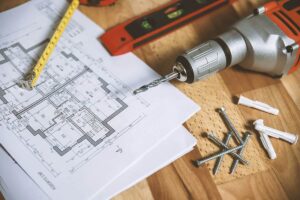Do You Need a Permit to Remodel a Bathroom?
Remodeling your bathroom can be one of the most exciting home projects you do. When it comes to tackling this project, there’s often one big question that arises: Do you need a permit to remodel a bathroom?
The answer is not always as straightforward as you’d like. In most cases, the answer is yes; the local government or municipality usually requires permits when it comes to remodeling a bathroom. However, this requirement can vary from one place to another, so it’s important to check with your local building codes before starting your project.
If you do need a permit for your bathroom remodel, you’ll likely need to submit plans for the project. You may also be asked to provide proof of insurance in case something goes wrong during the remodeling process. Additionally, it’s important to consult with a professional contractor or architect who can help you create a plan that meets all building codes and regulations.
Minor Plumbing Projects and Permit Requirements
When it comes to minor plumbing projects in your bathroom remodel, such as replacing a faucet or shower head, you might be wondering if a permit is necessary. The need for a permit can depend largely on the scope of the plumbing work and the specific regulations in your region.
For simple replacements or repairs, a permit may not be necessary. However, if you’re planning to modify or move existing plumbing systems, like relocating your toilet or installing a new bathtub, you’ll likely need a permit. This is because such alterations can significantly impact the safety and functionality of your home’s overall plumbing system.
Remember, each municipality has different rules and it is crucial to check with your local building department or hire a knowledgeable contractor to ensure you are adhering to all necessary regulations. Ignoring the permit process can lead to hefty fines, not to mention potential issues when it comes time to sell your home. It’s better to be safe than sorry when dealing with any remodeling project, especially those involving plumbing.
Minor Electrical Projects and Permit Requirements
When planning a bathroom remodel, electrical work might also be a component of your project. Just like in the case of plumbing, the permit requirements for electrical work vary depending on the extent of the project.
If you’re undertaking minor electrical projects like replacing an existing light fixture or installing a bathroom fan, you may not need a permit. However, more extensive changes such as adding new electrical circuits, moving existing electrical outlets, or installing a whirlpool tub with an integrated heater that requires dedicated circuits, often require a permit. This is due to the potential fire hazards and safety concerns related to improper electrical installations.
Again, it’s advisable to consult with a licensed electrician or contractor before starting your project. They can provide guidance and assistance in understanding the local permitting requirements for your specific project. Skipping the permit process for significant electrical work can result in penalties and complicate future attempts to sell your property. As with all aspects of bathroom remodeling, it’s crucial to follow the rules and regulations set by your local building department to ensure a safe and successful project.
Building Codes by County
Building codes and permit requirements differ significantly from county to county. It’s important to familiarize yourself with the specific regulations in your area to ensure that your bathroom remodel complies with all local codes. Here are a few examples:
Los Angeles County, California
In Los Angeles County, a permit is necessary for most bathroom remodels, especially if you plan to alter the plumbing or electrical systems. This county strictly enforces its codes to maintain safety and uphold the quality of all structures within its jurisdiction.
Cook County, Illinois
For residents of Cook County in Illinois, you are required to obtain a permit for any construction, alteration, repair, or installation of equipment in residential and commercial structures. This includes bathroom remodeling if it involves changes to the plumbing or electrical systems.
Miami-Dade County, Florida
Miami-Dade County in Florida requires a permit for bathroom remodels that involve changes to the structural, plumbing, or electrical components of the property. You’ll also need to submit two copies of your plans for review by the county’s Building Code Compliance Office.
Remember, regardless of where you live, it’s always wise to verify the specific building codes and permit requirements with your county’s building department. Most of these departments have information available online, but you can also call or visit in person to ensure you have the most accurate and up-to-date information. Doing so can help avoid costly fees, delays in your project’s completion, and potential issues when selling your home in the future.
Navigating Bathroom Remodel Permits
The process of acquiring the necessary permits for a bathroom remodel can seem daunting, but it doesn’t have to be. Here are some steps to help you navigate this process:
- Research Your Local Codes: Your first step should be to familiarize yourself with your local building codes and regulations. As stated before, these can vary significantly from one county to another.
- Prepare Detailed Plans: When applying for a permit, you will typically need to submit detailed plans for your remodel. These should include any changes to the plumbing, electrical, or structural elements of your bathroom.
- Consult With Professionals: It’s advisable to consult with a licensed contractor, architect, or electrician. They can provide invaluable advice and may even be able to handle the permit application process on your behalf.
- Submit Your Application: Once your plans are prepared, you will need to submit them to your local building department, along with your application for a permit and any necessary fees.
- Await Approval: After submission, your application will be reviewed. This process can take anywhere from a few days to a few weeks, depending on your locality. Once your permit is approved, you can begin your remodeling project.
Remember, while the process may seem tedious, obtaining the proper permits is crucial. Not only does it ensure the safety and legality of your project, but it also protects your investment in your home.
FAQ
Can I Remodel my Bathroom without a permit?
It depends on the extent of your bathroom remodel. For minor updates like painting or replacing fixtures, you probably won’t need a permit. However, significant changes, especially those involving plumbing or electrical systems, often require a permit. Always check with your local building department to be sure.
What can happen if I remodel without a Permit?
Remodeling without a permit can lead to fines and penalties. Additionally, unpermitted work could complicate future attempts to sell your home, as prospective buyers or their inspectors may request to see permits for remodel work.
How do I get a permit for my bathroom remodel?
The process involves researching your local codes, preparing detailed plans for your remodel, consulting with professionals, submitting your application to your local building department, and awaiting approval.
How long does it take to get a permit?
The time it takes to get a permit can vary widely, depending on your locality. It can range from a few days to a few weeks.
Do I need a permit to change a bathroom vanity?
Generally, changing a bathroom vanity, which is considered a minor upgrade, does not require a permit. However, if plumbing or electrical works are involved, you may need a permit. Always check with your local codes to be sure.
Understanding the permitting process for remodeling your bathroom can help ensure a smooth and successful project. It’s worth taking the time to research your local codes, consult with professionals, and acquire any necessary permits before beginning work. Doing so ultimately saves you time and money in the long run! With the right preparation and the right professionals on your side, you can enjoy a beautiful new bathroom without any headaches.
Selecting a Licensed Contractor for Your Bathroom Remodel
When planning your bathroom remodel, one of the most important decisions you’ll need to make is selecting a licensed contractor. This professional will guide you through the process, ensuring that your project runs smoothly from start to finish.
Here are a few factors to consider when choosing a contractor:
- Experience and Expertise: Just like any other profession, experience matters when it comes to contractors. Look for a contractor with a solid track record of successful bathroom remodels. They should be familiar with local building codes and permit requirements.
- Licensing and Insurance: Always verify that your contractor is licensed and insured. This protects you in case of damage or injury during the remodel.
- References and Reviews: Ask potential contractors for references and read online reviews. This will give you a sense of their work quality and customer service.
Remember, remodeling your bathroom is a significant investment, and the contractor you choose can make all the difference. Take the time to research and choose wisely.
Cost Considerations for a Bathroom Remodel
Here are a few cost considerations:
- Scope of the Remodel: Are you planning a simple update or a complete overhaul? The more extensive the remodel, the higher the cost.
- Materials: The quality and type of materials used can greatly affect the cost of your remodel. For example, marble countertops are more expensive than laminate ones.
- Labor Costs: Labor costs can make up a significant portion of your remodeling budget. Be sure to factor this into your overall cost estimates.
It’s important to set a realistic budget for your bathroom remodel and to include a contingency for unexpected expenses. With careful planning and budgeting, you can ensure a successful remodel that adds value to your home.
Where to Start a Bathroom Remodel
Beginning a bathroom remodel can seem overwhelming, but with careful planning, the process becomes easier. Here’s a roadmap to guide you:
- Set a Budget: Before anything else, determine how much you’re willing to spend. This will influence every aspect of your remodel – from the type of materials you select to the professionals you hire.
- Plan Your Design: Envision the final look of your bathroom. Would you like a spa-like retreat or a functional, clean space? Browse magazines and websites for inspiration, noting down styles and features you like.
- Consider Functionality: Assess your needs and wants. Prioritize key aspects, such as storage, lighting, and fixtures. Remember, a beautiful bathroom is useless if it doesn’t meet your functional needs.
- Research Local Codes and Permits: Check if you need a permit to remodel your bathroom. As we’ve discussed, this varies from one locality to another and depends on the extent of your remodel.
- Hire a Contractor: Unless you’re planning a minor update, consider hiring a licensed contractor. They can guide you through the process, ensure compliance with local codes, and help prevent costly mistakes.
- Prepare for Disruption: A bathroom remodel can take weeks, during which your bathroom may be unusable. Plan accordingly to minimize inconvenience.
- Begin the Remodel: Once your plans are in place and your materials are ready, it’s time to start the remodel. Be prepared for unexpected issues and changes to your plan – flexibility is key to a successful remodel.
For More Details You Can Contact Us








